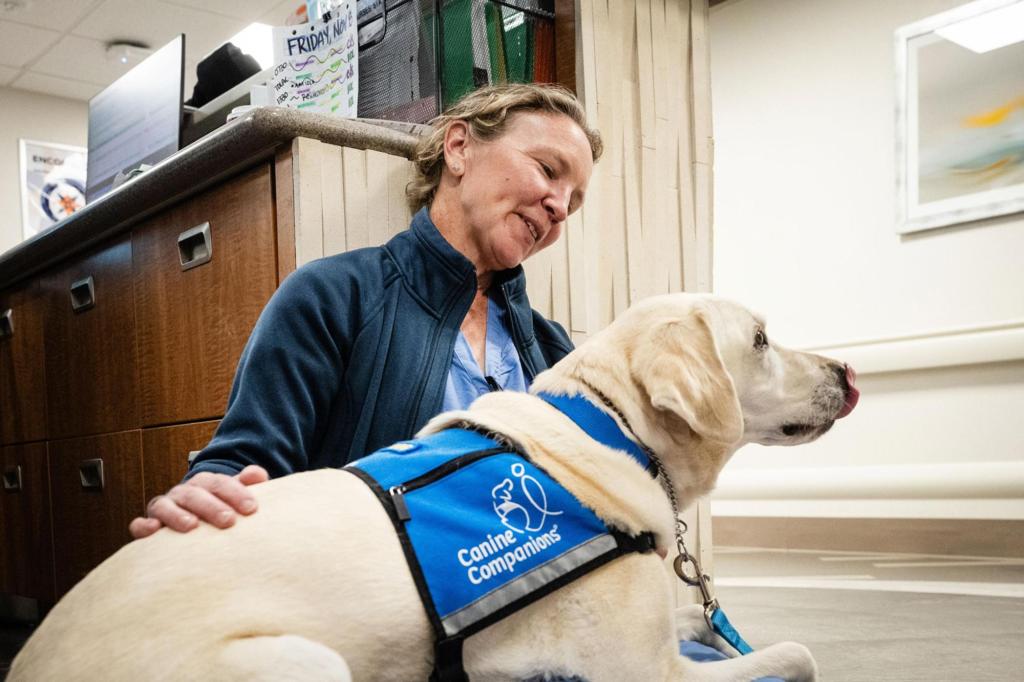By John Daley, Colorado Public Radio, Kff Health News
Denver – outside HCA Healthone Rose Medical center, snow is flying. Inside, on the third floor, there is a burst of activity within the delivery and delivery unit.
“There is a lot of action up here. Sometimes it can be very stressful, ”said Kristina Fraser, an Ob-gyn in blue bushes.
Nurses roll a very pregnant mother’s past.
“We are going to bring a baby to this world safely,” said Fraser, “and we leave.”
He said he feels partly ready due to a relaxing moment that had a few minutes before with some canine colleagues.
A couple of dogs, who moved the queues, had come in a nearby nursing station, causing around a dozen medical professionals to melt in a collective pond of affection. A yellow laboratory called Peppi shook Fraser in Nuzzles and kisses. “I don’t know if a human baby smells as well as that puppy breathing!” Fraser had said while his colleagues laughed.
Dogs are not visitors. They also work here specifically for the benefit of staff. “I feel that dog simply walks and everyone breathes deeply and puts themselves on the floor and has some moments of decompressing,” said Fraser. “It’s great. It’s amazing. “
Hospital employees who work with dogs say that there is practically no risk of bite with carefully trained farmers, the preferred race for this work.
Dogs remain away from allergic patients and wash regularly to prevent germs from spreading, and people should wash their hands before and after caressing them.

Doctors and nurses face a growing mental health crisis promoted by their work experiences. They and other medical care colleagues face High depression ratesanxiety, stress, Suicidal ideationand exhaustion. Almost half of the health workers reported that they often felt exhausted in 2022, an increase of 2018, according to the Centers for Disease Control and Prevention. And the percentage of health workers who reported harassment At work he doubled during that four -year period. The defenders of the presence of dogs in hospitals see animals as a thing that can help.
That includes Peppi’s Handler, Susan Ryan, a doctor of emergency medicine in Rose.
Ryan said the years that work as an emergency doctor left her with PTSD symptoms. “I was simply in poor condition and knew it,” said Ryan, who isolated more at home and didn’t want to interact with friends. “I put everything. I think we all do it.”
She said doctors and other suppliers can be good to hide their struggles, because they have to compartmentalize. “How else can I go from a patient who had a heart arrest, deal with family members telling them that and go to a room where another person is angry because he has had to wait 45 minutes for the pain of his ear? And I have to turn that switch. “
To cope with his symptoms of posttraumatic stress disorder, Ryan began to do horses therapy. But he couldn’t have a horse in his backyard, so he got a farmer.
Ryan received training from a group of national service dogs called Canine companionsbecoming the first doctor trained by the group to have an installation dog in an emergency room. Canine Companions has graduated more than 8,000 service dogs.
The Rose Medical Center gave Ryan the approval to take a dog to work during his ER shifts. Ryan’s colleagues said they are delighted that a dog is part of their working life.
“When I have a bad day at work and I come to Rose and Peppi is here, my day will be improved,” said Emmine Richardson. “And if I have a patient who is having a difficult day, Peppi only knows how to illuminate the room.”

Nursing supervisor Eric Vaillancourt agreed, calling Peppi “Joyful”.
Ryan had another dog, Wynn, working with her during the peak of the pandemic. She said she thinks Wynn made a big difference. “He saved people,” he said. “We had new nurses who had never seen death before, and now they are seeing a covid death. And we were worried sick, we were dying. “
She said her hospital system has lost a couple of doctors for suicide in the last two years, which HCA confirmed Kff Health News and NPR. Ryan expects the canine connection to help with trauma. “Anything that brings you back at the current time helps to bother you again. A dog can be that soothing influence, ”he said. “You can go down to the ground, stroke them and simply calm.”
Ryan said the investigation has shown the advantages. For example, A review of dozens of original studies In human-animal interactions they found benefits for a variety of conditions, including behavioral problems and mood and physical symptoms of stress.
The president and CEO of Rose, Casey Guber, became a believer in the canine connection that achieved his own dog trained to take to the hospital, a mixture of black laboratory retriever called Ralphie.
She uses a badge: Dog director.
Guber said it is a great moral reinforcement. “Phenomenal,” he said. “It is not uncommon to see a surgeon come to our administration office and roll on the ground with Ralphie, or one of our nurses that leads Ralphie to walk around the park.”
This article is from an association that includes RCP news , Npr and Kff Health News.
© 2025 Kaiser Health News. Visit Khn.org. Distributed by Tribune Content Agency, LLC. © 2025 Kff Health News. Distributed by Tribune Content Agency, LLC.
Originally published:



